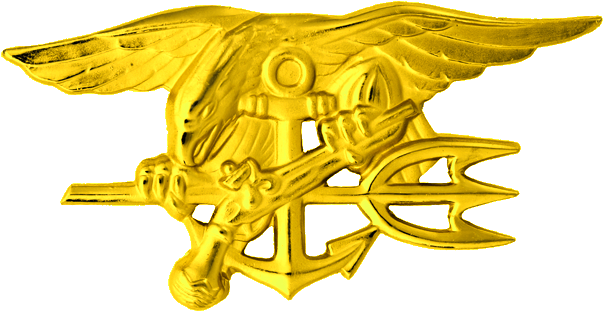Bayard & Holmes
~ Jay Holmes

US Navy SEAL Trident
Image public domain
Effective November 30, 2019, Seal Team Seven member Chief Special Warfare Operator Eddie Gallagher retired from the US Navy after twenty years of service. Though Gallagher remains on Fleet Reserve status, it is highly unlikely that he will ever return to active duty. His career is over, but the impacts of his career will continue to reverberate through the US Navy, as well as the entire US military establishment. It would do the nation well for Gallagher’s career to reverberate through the broader US society, but it will likely soon be forgotten by the public.
Gallagher joined the US Navy in 1999. During his twenty years of service, he completed eight combat deployments that I know of. I write “that I know of” because SEAL teams often deploy on short-term missions that are not made public. However, at a minimum, we know that Gallagher completed eight documented tours of combat duty.
Many US Navy SEALs retire each year without their names ever being uttered by a media outlet. Young men enlist. Some volunteer for SEAL selection. Comparatively few complete the training. Those few then continue to train. Then they deploy and fight, and they either die or survive. The survivors then train some more, go to war again, etc. Some die or are permanently maimed. The fortunate ones survive this cycle of training and fighting in reasonably good health and retire. Their wives and children try to breathe a sigh of relief and adjust to a new life, but most of the country does not notice.
Gallagher, of course, was not your average US Navy SEAL. In 2018, he was charged with multiple criminal counts, including murder, two counts of attempted murder from two other separate incidents, and multiple counts of intimidating witnesses.
The media and the country took notice. Long before a court-martial could be convened or the details of the actual charges made public, opinions in and out of the military began to form. In many cases, the opinions were, and remain, passionate in the extreme. They range from “Gallagher should be hanged,” to “Gallagher is an American hero.”
Details of the case, along with imagined details of the case, have been thoroughly covered by the media, but there are some salient points worth reviewing.
Gallagher was accused of murdering a wounded, captured ISIS member in Iraq in 2017. He was accused of threatening witnesses who were fellow SEALs and of attempting to orchestrate a “blacklisting” of the witnesses by the SEAL community. He was accused of purposely shooting at civilians in Iraq and Afghanistan. Gallagher also was charged with violating rules by posing for a picture of himself with the freshly-dead prisoner and sending that picture in a text to a friend. Interestingly, Gallagher’s commanding officer, Lieutenant Jacob “Jake” Portier, posed with Gallagher for the picture. That should tell us something about the command culture under which Gallagher was operating.
Did Eddie Gallagher commit some or all of these crimes? I wasn’t there, so I don’t know. There is much about the Gallagher case that we cannot determine with any certainty, as there are conflicting testimonies. What I do know is that he was acquitted by a US Navy court-martial panel of all the charges except for the picture-taking charge.
For the picture-taking charge, Gallagher received the maximum sentence of four months confinement. He was also reduced in rank from E-7 (Chief) to E-6 (Petty Officer First Class). The demotion mattered because it significantly reduced Gallagher’s Navy retirement payments. Since he had already served more than four months of confinement, he was released after his sentencing. On November 15, 2019, President Trump reinstated Gallagher to his rank of Chief Special Warfare Operator.
What I also know about the Gallagher case is that the US Navy overall and the US Navy judicial system in particular did a lousy job handling it. It is now evident that senior members of the judicial system and other senior Navy officers exerted unlawful command influence (“UCI”). Senior Navy officers were angry over “the incident.” Based on their statements, their anger stems from the fact that the Gallagher case was good press for the bad guys and bad press for the good guys. In the modern US military, generating bad press is a serious crime.
One glaring example of what the courts-martial system calls unlawful command influence seems to have been committed by now-retired Navy Judge Advocate Vice Admiral James W. Crawford.
I have not seen any mainstream media coverage concerning Vice Admiral Crawford. As far as I am able to determine at this point, Crawford’s interference in Gallagher’s case has not been investigated, but it was recognized by the court-martial panel. In a completely unrelated, but equally serious case, Crawford was found by a military appellate court to have committed UCI. Some members of the judicial system recommended that the US Navy delay Crawford’s retirement so that he could be prosecuted for that instance of UCI. The Navy chose to allow Crawford to retire without any further investigation. I mention Crawford’s demonstrable instance of UCI because it proves that he was, in fact, willing to commit UCI.
Other misconduct by the prosecution included interfering with Gallagher’s access to his attorney and not calling credible witnesses who were offering exculpatory testimony in Gallagher’s favor. In one instance, an Iraqi General was not allowed to testify on Gallagher’s behalf. The defense also alleges that a video showing the prisoner severely wounded and near death when he was brought into camp was taken into evidence and vanished while in the possession of the prosecution. The Navy also botched the case by waiting too long to investigate the charges.
Some of the allegations predate the alleged 2017 killing of the wounded prisoner. Gallagher’s command failed to escalate the case to the Navy judicial system. The case did not reach the Navy judicial system until after witnesses went outside of SEAL Team Seven’s chain of command. That aspect of the badly-handled case can’t be blamed on the judicial system. The delay of any investigation must be blamed on Gallagher’s chain of command.
In the US Navy, murder is a serious crime, but for many senior Navy officers, embarrassing the US Navy is a far more serious offense.
Senior Navy officers feel responsible for the well being of the US Navy and the reputation of a Navy that most of them genuinely love and honorably devote their lives to. Unfortunately, that love that they feel for their Navy can lead them at times to ignore allegations of misconduct. In other instances, they may act over zealously in the prosecution of anyone who they feel tarnishes the image of the US Navy.
This is not a uniquely American phenomenon.
The UK military is currently being accused of massive cover-ups of various war crimes by UK soldiers and Marines. Similar accusations have surfaced in France and Italy in recent years. The nature of those accusations would be a topic for another day, but we should recognize the universal nature of these issues. How an individual country responds to allegations of war crimes depends on the country. In many countries, they simply don’t matter. In the United Kingdom and the United States, they matter. We would do well as a nation to recognize and remember certain aspects of the Gallagher case. Exerting unlawful command influence is wrong and should no longer be tolerated. It can lead to the conviction of innocents or, when exposed, the exoneration of guilty parties. Neither of those helps our military or our foreign policy agendas.
Another aspect of the Gallagher case which is more difficult to clarify and has been almost completely ignored is the awkward and unwelcome question of Eddie Gallagher’s mental health.
Gallagher served for twenty years. For most of that time, his career was without controversy. When serious allegations about his conduct in combat began to surface 2015, he had already been in the Navy for sixteen years. If Gallagher is, indeed, a dangerous criminal as the Navy judicial system claimed, how did he serve without any serious incidents for sixteen years? How does a man serve effectively and honorably for sixteen years without incidence and then become a dangerous criminal?
We are left with two choices as to what we believe about Gallagher.
The first choice is to accept the court-martial result and assume that he was, indeed, innocent of all the charges except posing for the infamous picture. If that’s the case, then we should all be very worried about the terrible job that the Navy judicial system did with the Eddie Gallagher case. If, on the other hand, we wish to assume that Gallagher did indeed murder the wounded ISIS prisoner and/or previously purposely shoot unarmed civilians, then we need to ask how and why that happened. How does a long-standing, decorated member of the Navy SEALs end up doing such things, if, indeed, he did do them? The answer to that question goes way beyond Eddie Gallagher.
Collectively, as a nation, we are living in denial about some of the consequences of combat.
Combat, especially multiple deployments to war zones over long periods of time, can negatively impact an individual’s decision-making ability. In the case of Gallagher, he was undergoing treatment for brain trauma at the time he was arrested due to at least one concussion that he suffered in combat. Long before that treatment started, the Navy should have paid attention to the allegations that his behavior was radically changing. Chief Special Warfare Operators are a rare and valuable commodity, so it is always extremely tempting for commanders to overlook signs of combat fatigue, PTSD, etc., and return an experienced warrior back to combat rather than send him for effective treatment.
I am not a physician and have not read Gallagher’s medical records, so I cannot be certain that his health played any role in incidents which were alleged to have occurred during his last two deployments. However, this is certain: All branches of the US military have pressured military medical personnel to certify military personnel suffering from PTSD and other serious health disorders as fit for combat.
This issue predates the Gallagher case by many decades. In World War II, commanders routinely pressured military physicians to certify soldiers with serious health issues as “fit for combat.” The same thing occurred on a grand scale in Korea and Vietnam. The root of the problem extends far beyond the US military. Mental health and neurology lag behind the other branches of medicine. Mental and neurological patients remain stigmatized in most societies. No warrior would hesitate to point out to his comrade that he is bleeding or showing other symptoms of injury, unless it is a mental health injury. Then it becomes a very difficult subject.
If, as a country, we wish to continue the practice of ignoring the mental health issues of our fellow citizens who we send to fight our wars for us, then we should expect to hear about more incidents like the Eddie Gallagher case. It has happened before, and it will happen again. Whether or not mental health played a part in the Eddie Gallagher case, we should end the practice of ordering physicians to certify unhealthy warriors as fit for duty. For those who feel no sympathy for Eddie Gallagher and feel that he “got away with murder,” they have the military judicial system to blame for that.
That system investigates and prosecutes thousands of cases each year, ranging from overdrawing a checking account to rape and murder. In my opinion, the military system does a better job than our civilian judicial system in most cases, but when unlawful command influence occurs, justice can quickly be perverted. The Eddie Gallagher case was clearly impacted by judicial misconduct on the part of prosecutors and commanding officers. It may have also been influenced by neurological health issues suffered by Eddie Gallagher which went untreated for too long. Our warriors deserve better, and the entire nation deserves better. We should demand better.
Politicians control our military, and we control our politicians. If we don’t like what happened in the Eddie Gallagher case, then we should demand change. Politicians will do whatever it takes to get enough votes. Whether or not the desired changes will occur depends on whether or not you and I speak up to our congressmen.
* * * * * * * * * * * * *
Now on pre-sale!
SPYCRAFT–The Good, the Bad, & the Booty: Key Figures in Espionage

Hollywood has yet to produce either heroes or villains that can match the heights and depths of humanity. Who is more courageous than a one-legged woman, “the most dangerous spy in all of France,” operating in Nazi-occupied territory? Who is more extraordinary than a young man left for dead, not worth a Viet Cong bullet, who survives to hunt down terrorists for six more decades? Who is more heroic than a homeless child living in a cardboard box who grows up to be an iconic showgirl, an espionage legend, and a tireless humanitarian? And what villain is more malevolent than the traitor that lurks in our midst, walking our halls and eating at our tables, while helping our enemies murder our own and butcher thousands of innocents?
Join us as we explore the lives of these espionage elites and others who prove that “we’re only human” is not an excuse to fail, but a reason to succeed.

In the American government, there is a pervasive cover up culture, one that leads to cases like this. Things that should not be classified end up classified for decades, muddying the system and making judicial oversight of some the nation’s most politically powerful near impossible.
There are deep systemic problems at the root of this case, and as long as the military industrial complex remains the biggest power broker in the western hemisphere I see no way to address or change them. Corruption blooms in the darkness, and Eddie’s case is just the most obvious recent symptom.